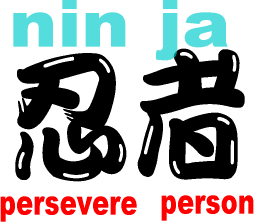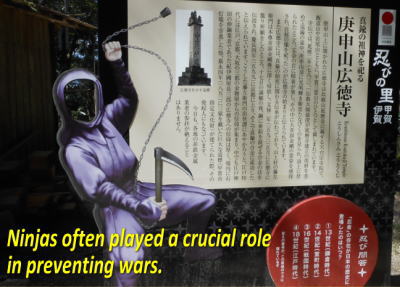Differences Between English and Japanese
Japanese Reasoning and Logic
 The Needs of the Many... The Needs of the Many...
If you’re familiar with a Star Trek world, imagine a scene of crew members having lunch at a restaurant.
Waiter: Can I take your order?
Cork: Ah... a steak with boiled green asparagus, mashed potatoes, ... blah, blah, blah...
McHoy: Fried chicken and fried okra, please.
Skirt: Ay, Neeps and Tatties, and a wee glass of scotch, lad.
Olala: Hmm... I’ll try some Bobotie.
Slow: Swordfish sashimi and sushi with a bowl of miso soup.
Checkhoo: Solyanka and Chicken Kiev.
Waiter: And you, sir?
Japock: What is the dish most ordered within the last 59 minutes?
Waiter: Ah, let me check the database. (After a while) Curry and rice, sir.
Japock: Fascinating. I’ll have that curry and rice.
Everyone: (Gravelled) Why?
Japock: Because logic dictates: The needs of many outweigh the needs of the one.
Well said, Japock. A weekday lunchtime restaurant is one of the best examples where that concept applies. However, significantly different from the above example, a Japanese lunch table is unvarying.
When one says, “Teishoku” (a set meal of the day), others will easily follow suit. That’s because lunch is a short mealtime, and ordering the same quick dish may be efficient for the meal server and eaters; it’s easier for the chef to prepare the same plate, and the group doesn’t have to wait for the last-served member to finish. Therefore, even if some want to have a different thing, they can easily convince themselves: “The needs of many stomachs outweigh the needs of the one”.
However, even though it may sound sensible, I must attribute their focus on collectivity to the Japanese psyche. They feel safe and secured when doing or being the same as others because even if they fail, everyone fails, too, and that means they can plot along the thorny road together. Thus, I can draw a Japanese logic pattern like the following:
Japanese logic 1: Doing what many others do is the right thing to do.
Therefore, the “keep up with the Joneses” metaphor may work better than the “be the first in the pack” plot when it comes to pitching. Not always, though.
 Cool Like a Ninja? Cool Like a Ninja?
Ninjas are cool. Apart from their high level of magical skills, what makes them special is their ability of keeping their cool anytime, anywhere. Even when they get injured or lose their partner during operation, they remain stoic. So, if you think they are a Japanese version of high-profile, trigger-happy Rambo or kung-fu hero splurging karate chops (which they don’t use) and shurikens (which they spare), you’re very, very wrong. That’s a Hollywood version and nothing to do with the real one I’m talking about now.
 Here’s a little kanji lesson. The word “ninja” comprises two kanji characters 忍 and 者, meaning "persevere, conceal oneself" and "person, one", respectively. So, authentic ninjas are low-profile and trained to maintain composure.
Here’s a little kanji lesson. The word “ninja” comprises two kanji characters 忍 and 者, meaning "persevere, conceal oneself" and "person, one", respectively. So, authentic ninjas are low-profile and trained to maintain composure.
Although the entire nation is not ninjas, many Japanese don’t overtly express their feelings in public. Since childhood, parents teach their children how to restrain their emotions even if wind swirls and rain pours inside them. Probably, this is related to bushido or Japanese warriorhood and separates them from other Asian peoples. Hence, an enduring tranquil line of disaster-struck people for emergency supplies. Now, another Japanese logic pattern would be:
Japanese logic 2: Perseverance and patience are a virtue.
 The Real Meaning of Japanese "I'm Sorry" The Real Meaning of Japanese "I'm Sorry"
A quick-judging non-Japanese may think that Japanese people’s saying “sorry” is the admission of their guilt. But not so fast. Now please bear with me while I illustrate it with a typical example:
A fender bender involving two cars, one driven by a non-Japanese and the other, Japanese
Japanese: Are you all right? I’m sorry!
(In his/her mind: If I were 120% careful, this might haven’t happened, so saying ‘sorry’ first is a polite way, and this person would do the same. Then, we can avoid an unnecessary conflict and start a reasonable negotiation.)
Non-Japanese: Yeah, you are responsible! You admit it. You should pay all the damages.
To my chagrin, the Japanese, an isolated islander people for centuries, are sometimes so gullible that they can't even imagine apologizing can mean admitting their guilt to outlanders.
By the way, here’s a Japanese proverb: “Lose now and win later (負けるが勝ち)”, which reflects their quick apologizing. Japanese “I’m sorry” often aims to avoid emotional, energy-consuming strife at the scene and seek a peaceful solution. Therefore, if it’s between two decent Japanese people, they exchange quick apologies first, which, of course, never means “I'm the responsible one”. Hence:
Japanese logic 3: Saying “sorry” considers the other's feelings and wise way to a peaceful solution.

Often compared to a spy, ninjas contributed to impeding wars.
|



